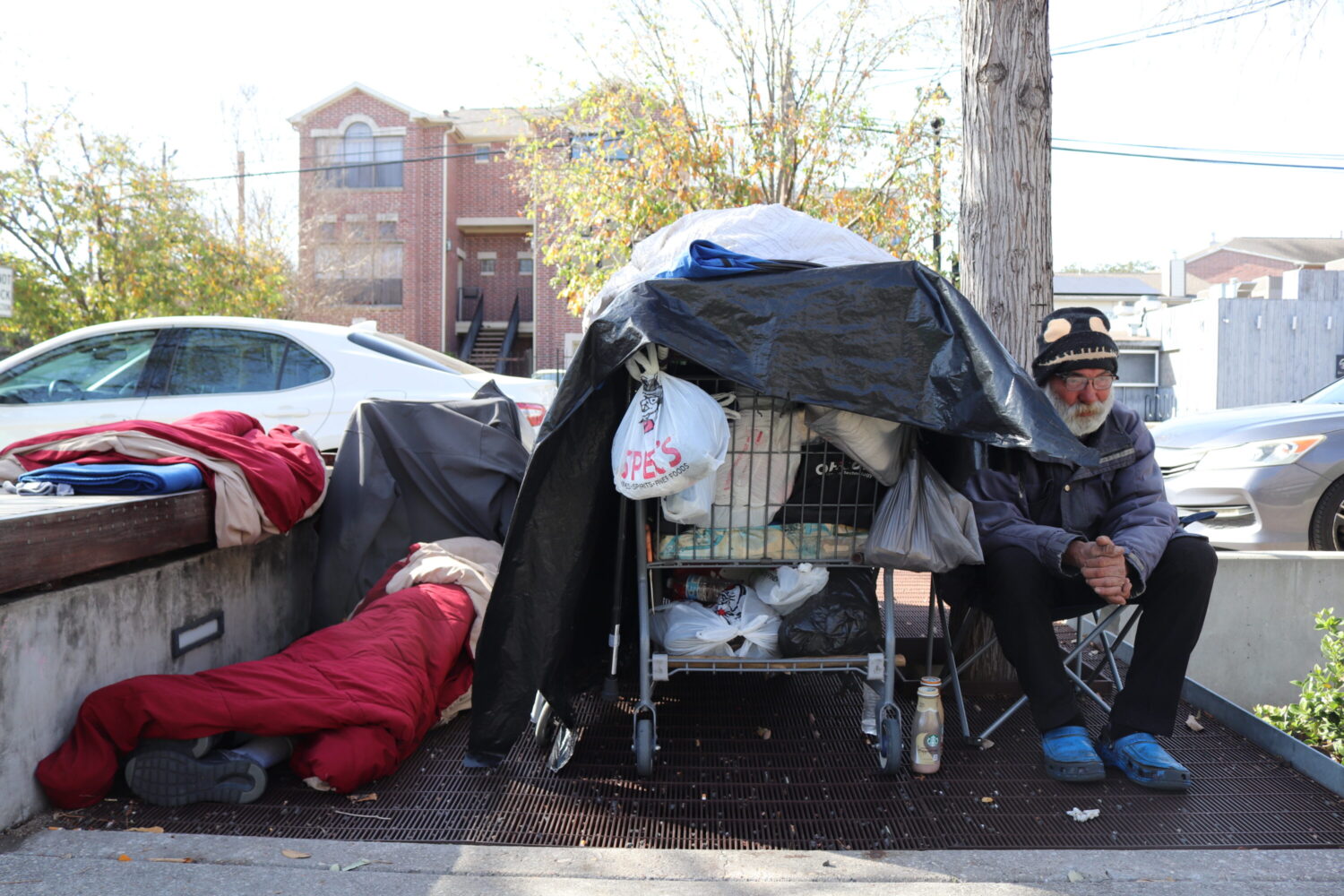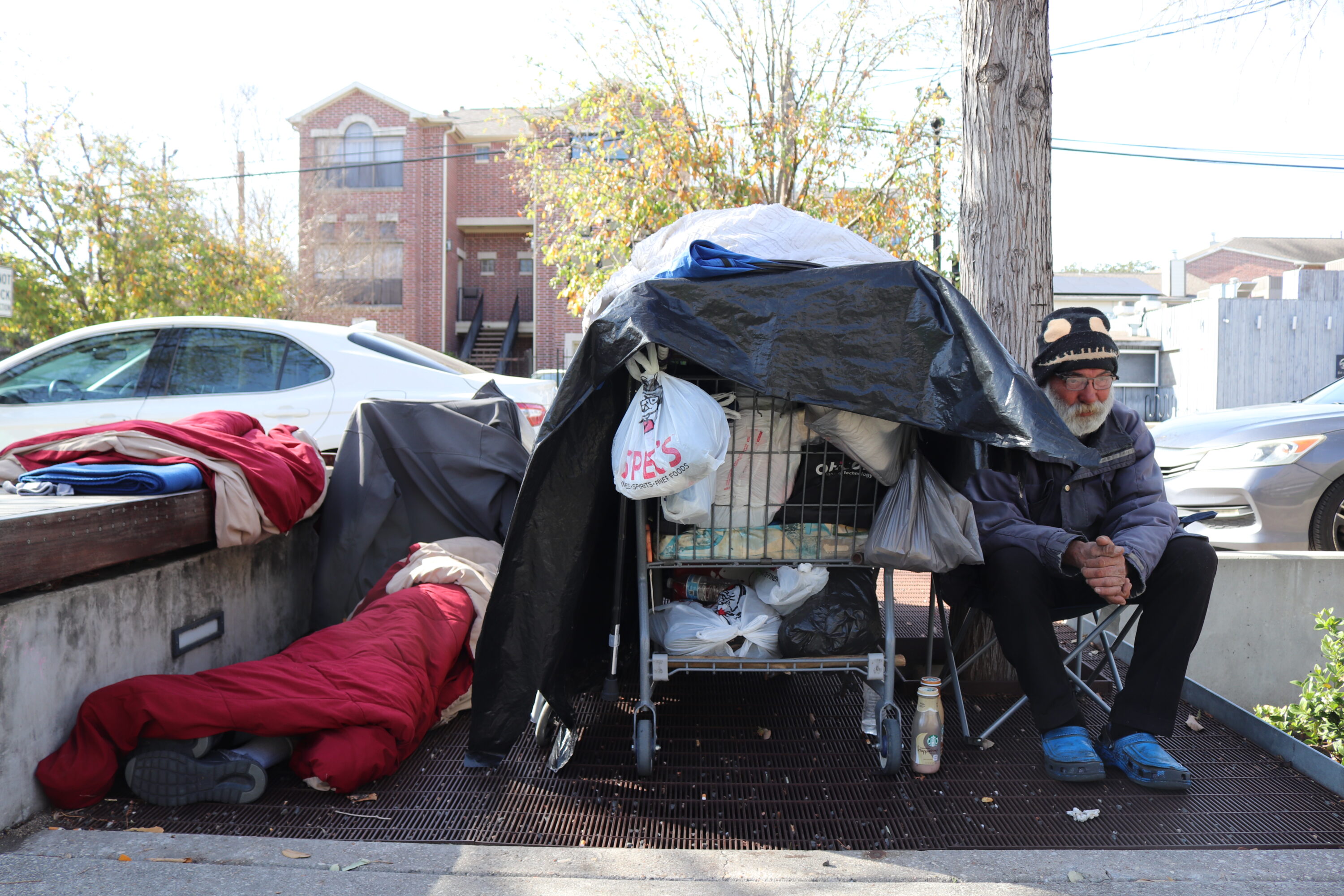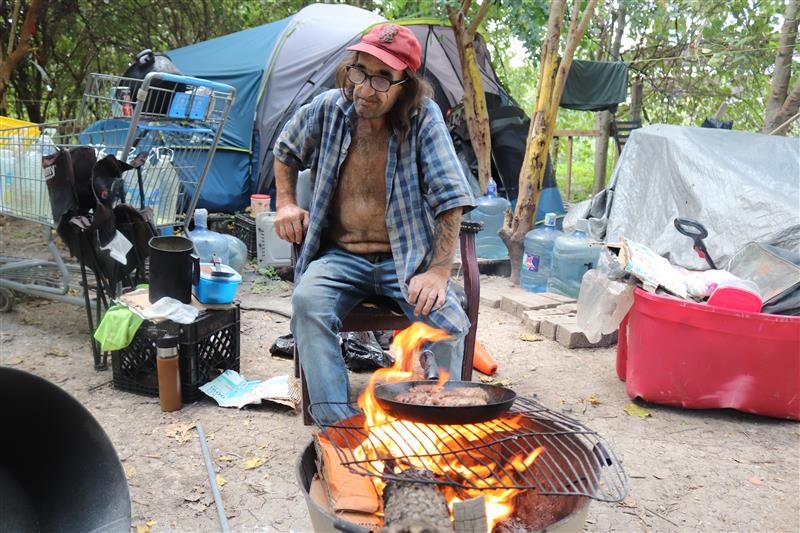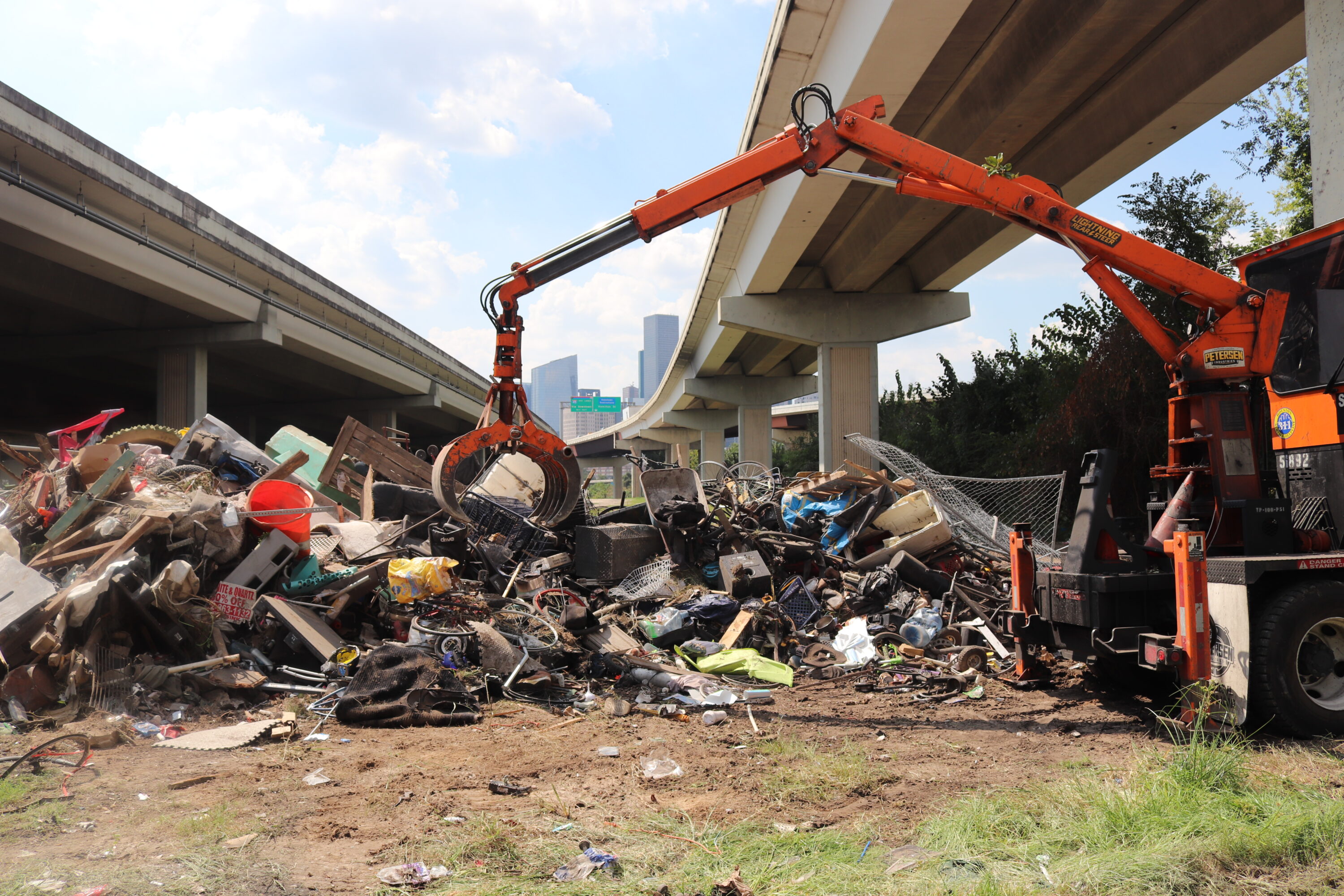Dominic Anthony Walsh, HPM
Dave sits on a chair next to a shopping cart full of his belongings on Bagby Street in Houston’s Midtown. March, 2025.
In the two months following the Houston City Council’s vote to expand the so-called civility ordinance, the Houston Police Department issued more than 500 tickets to homeless people — marking the highest two-month rate of citations since Mayor John Whitmire took office last year.
Houston Public Media analyzed 10 years of citation data from Houston’s municipal courts related to two city rules — the civility ordinance, which prohibits sitting, lying down or placing personal possessions on sidewalks in certain parts of the city during the day; and the sidewalk obstruction ordinance, which generally prohibits blocking sidewalks across the city at all hours. In mid-July, the city council expanded the civility ordinance to be in effect 24/7 in the downtown and East Downtown areas as part of Whitmire’s effort to address street homelessness.
The ramped-up enforcement comes as part of a multipronged, $70 million initiative to move homeless people off the streets and onto paths to permanent housing.
Uneven enforcement over time
Altogether, HPD wrote nearly 29,000 tickets for violations of the rules since 2016. Some of the citations for obstructing a sidewalk without a permit did not target homeless people, but the majority of the tickets — about 19,500 — were issued to people whose addresses were listed as “homeless.”
The typical fine for the violations ranged from $194 to $252. In some cases, individuals received two tickets for allegedly violating each rule, doubling the fine.
Over the past ten years, fines were dismissed in court or remained unpaid more often than not. Of $6.5 million in total fines, more than $2.2 million was dismissed in court and more than $2.8 million remained owed to the city.
In nearly 5,500 cases, people had their fines credited for time served — meaning they had been jailed.
Before the city council voted to expand the civility ordinance, enforcement of the rules under Mayor John Whitmire was less stringent than under Mayor Sylvester Turner. During Turner’s time in office, from 2016 through 2023, HPD issued an average of 257 tickets per month. Prior to the ordinance expansion in mid-July, HPD under Whitmire issued an average of 188 tickets per month.
The expanded civility ordinance began on July 15. (Graph by Smita Patel/HPM)
During the first month of the expanded civility ordinance, HPD issued 242 tickets, followed by 324 tickets in the second month for a total of 566 — the highest two-month total under Whitmire, just ahead of the 538 tickets issued in the first two months of his time in office.
Over those years, Harris County’s unsheltered homeless population has fluctuated between approximately 1,000 and 1,500 — according to annual point-time-time counts by the Coalition for the Homeless and its partners — with no apparent correlation between the number of people living on the streets and the number of tickets issued for ordinance violations.
Mayor John Whitmire’s office and the Houston Police Department did not comment on the recent uptick in citations.
Hannah Lebovits, assistant director at UT-Arlington’s Institute of Urban Studies, co-authored an article published in July that examined the impact of criminalization policies on local homelessness. The research analyzed the passage of homeless-related municipal ordinances and homeless population trends across the 100 largest cities in the U.S.
Dominic Anthony Walsh/HPM
Edward Dewy sits in a wooded area near US-59. (Oct. 1, 2025.)
“We cannot draw a straight line from the passage of these ordinances to a reduction in homelessness specific to cities that are passing these ordinances,” Lebovits said. “The fact that they might be fined, the fact they might be arrested, the fact that they might have any kind of interaction with the criminal justice system doesn’t in any way help them manage their homelessness.”
A wide-ranging approach
The expanded civility ordinance is part of a multi-pronged approach to address homelessness by Whitmire’s administration. Houston Public Media reported last month on the administration’s plan to create a “superhub” for homeless people in central Harris County. Housing department director Mike Nichols said it would contain temporary beds and act as a referral service, sending homeless people to appropriate programs with the goal of placing individuals on a path to permanent housing.
“If we’re going to tell people they can’t sleep on the street, we have to give them an alternative — and I’m not sure that’s the legal issue, but that is the real issue,” Nichols said. “Because no policeman wants to give somebody a ticket who is not going to pay it, or no police wants to take somebody down to the joint processing center who is experiencing homelessness.”
Details of the plan were sparse, including the exact timeline for the superhub to become operational. Nichols said the department intends to present the proposal to the city council sometime this month.
Lebovits said the housing-focused approach is “the best process for reducing homelessness,” but including criminalization as part of the strategy can complicate the effort.
“If we’re criminalizing someone’s current state, and every time that they have an interaction with the city their primary mode of interaction is through the police, and then you’re going to tell them, ‘Oh, but we’re actually going to give you services, and we’re really going to help you,’ — I don’t know that trust has been established,” she said. “Without trust, there’s no reason for somebody to uproot the current state they are in, to adopt a different state that they don’t know is going to be successful at all.”
The city is also continuing to clear homeless encampments. Over the past year, officials forced more than 100 people out of makeshift communities under highway overpasses and along the Buffalo Bayou.
On Wednesday, as the Houston Chronicle first reported, the city removed dozens of people from an encampment off of Nance Street under US-59 — offering services to all and arresting those who refused to leave. On Wednesday afternoon, heavy machinery continued lifting their belongings and trash into solid waste trucks.
Dominic Anthony Walsh/HPM
A crane removes belongings and debris from a homeless encampment off Nance Street under US-59 in Houston. Oct. 1, 2025.
Edward Lawrence Haverly sleeps in a makeshift shelter in a nearby wooded area. He said the city was “more than helpful” ahead of the clearing, warning residents to leave and offering referrals to programs and housing. Still, Haverly said, he will miss his friends.
“We all were family,” he said. “When it came down to the nitty-gritty, in the rough times, we all looked out for each other.”
As the city ramps up efforts to force people off the streets, the shelter system across Harris County remains insufficient for the size of the homeless population. There are nearly 2,000 shelter beds for a population of more than 3,300.
In late August, John Pedroza slept outside in East Downtown — one of the areas where the city council expanded the civility ordinance to be a 24/7 rule. After more than two decades of incarceration in a state prison, he was kicked out of a group home for causing a disruption. He had trouble finding shelter.
“There’s nowhere for me to go. There’s nowhere for me to sleep,” Pedroza said. “What can I do if these shelters do not accept me? I mean, my hands are tied. I can’t do anything.”



